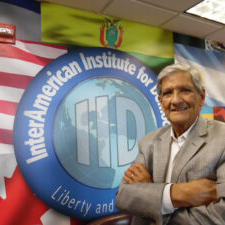Presentation by Ambassador Armando Valladares at the Forum "Two Argentinas: Democracy and Feudalism"

By: Armando Valladares - 15/02/2023
Share:
As President of the Human Rights Committee of the Inter-American Institute for Democracy together with Dr. Marcel Feraud, we made a working trip to the Argentine Republic from January 18 to 25 of this year with the purpose of verifying in situ the complaints received about the violation of human rights to citizens of Santiago del Estero, who have been deprived of their lands by officials who exercise political and judicial power with the most notorious case of Manuel Asencio Ardiles and his family. The objective of the trip also included monitoring the situation of the military political prisoners in Buenos Aires, continuing the management started in 2016 on the occasion of the Book Fair.
In Santiago del Estero we visited Manuel Asencio Ardiles and his family on January 20, in a situation of absolute misery and the wife said that for a long time to date she had not been able to buy medicines for her husband and we were able to see the living body of Ardiles in a state of partial and disabled consciousness. The man who, according to his lawyer"s version, traveled 20 kilometers by bicycle to consult him only 5 months ago, was skeletal and practically incapacitated.
We were able to verify the objective consequences of the eviction -which at the time was carried out by massive public force with violence and pressure as reported by the press- that the Ardiles family suffered when they were violently evicted from their field and house of approximately 30 hectares, with loss of property. their cattle and their goods and being confined in a small and miserable house that the neighbors provided them as charity.
The case was explained as a legal action carried out by Dr. Federico López Alzogaray, President of the Superior Court of Justice of Santiago del Estero, and was the subject of timely public and press complaints, but that did not have the effect of stopping the eviction or the sentence of made to the misery and death of the Ardiles family. A few days after our visit, on January 23, the death of Manuel Asencio Ardiles was reported, and his family remains in misery with no possibility of justice.
The Interamerican Institute for Democracy is commissioning a legal analysis of the process, which will include the arguments of the President of the Superior Court of Justice, who as a party has caused this whole situation.
However -in my opinion- due to the objective facts, the violation of the human rights of the late Ardiles and his family has been flagrant because they were subjected to and kept defenseless. The analysis of legal experts may help to establish responsibilities, but the damage to life, legal security, the right to work, private property, the presumption of innocence and other human rights cannot be hidden.
We made visits and meetings with political, administrative, and judicial authorities in Santiago del Estero, the same ones that served to confirm the defenselessness of the Ardiles family and learn that there are many, repetitive, and extreme situations of this type against families in that Province.
There is a violation of human rights in Santiago del Estero, tolerated and sometimes executed by the authorities, in a relationship of impunity for the powerful and defenselessness of citizens who do not enjoy the "rule of law" and in whom fear and submission are noticed .
The difference between citizens in democracy and vassals in feudalism is freedom, the rule of law and the separation and independence of public powers that, as essential elements of democracy, are not observed in the cases analyzed in Santiago del Estero.
In Buenos Aires, we followed up on the situation of 2,623 Argentine citizens who are imprisoned for the processes arising from the so-called dirty war; all the prisoners are military. 763 have died, of which 652 did not have a formal sentence.
“Human Rights are the set of prerogatives based on human dignity, whose effective realization is essential for the integral development of the person. This set of prerogatives is established within the national legal order, in the Political Constitution, international treaties and laws.
Human rights are rights inherent to all human beings, regardless of nationality, place of residence, sex, national or ethnic origin, color, religion, language, or any other condition. We all have the same human rights without discrimination. These rights are interrelated, interdependent and indivisible"
This quote that I made in Buenos Aires was complemented in the press conference that we offered on January 24, stating that:
WE HAVE IMPORTANT WORK AND WE HAVE COLLECTED AND PUBLISHED IN OUR PUBLISHING FUND THE OPINIONS OF ARGENTINE AUTHORS, JURISTS AND ANALYSTS WHICH ALLOWS US TO AFFIRM THAT "ARGENTINA HAS POLITICAL PRISONERS" FOR WHOM VERY LITTLE OR NO ONE CLAIMS BECAUSE THEIR EXECUTIONERS HAVE IMPOSED THE NARRATIVE OF SHAME FOR HUMAN RIGHTS DEFENDERS.
OUR PRESENCE, THE MEETINGS AND INTERVIEWS THAT WE HAVE HAD IN THE FIELD OF ARGENTINE POLITICAL PRISONERS ARE DESTINED TO POINT OUT THIS ATROWIOUS ABNORMALITY AND TO REQUEST THE ABUSE AGAINST PEOPLE WHO HAVE NOT HAD LEGAL EQUALITY AND AS A CONSEQUENCE HAVE BEEN DEPRIVED OF DUE PROCESS OF LEGAL AND SUBJECTED TO A SITUATION OF DEFENSION.
It is vital that democracy, the leaders, political, social, union and citizen leaders, as well as the institutions of the Argentine Republic attend to a fact that is already publicly and internationally recognized by the press and experts: there is a democratic Argentina and a feudal one. not to say dictatorial or undemocratic. In the first, the rights of citizens are respected, in the second there are vassals and political prisoners.
Thank you so much
Ambassador Armando Valladares
February 15, 2023
«The opinions published herein are the sole responsibility of its author».